It’s the New Year, and with it comes a new wave of prognostications that seek to give direction to operators and chefs looking for “the next big thing.” What can we look forward to?
Courtesy of Sysco Shape
Industry oracles see the continuation of such mega-trends as healthful dining, local sourcing and the ratcheting up of flavor profiles. In addition, sweet and spicy mashups, the blending of mushrooms with ground meat, increased menu transparency and the rise of Generation Z will help to drive innovation as we progress into the year. Here are 10 trends to watch in 2015.
A Matter of Taste
Middle-of-the-road flavor profiles are out; robust flavors are in. Once noted for their unadventurous palates, Americans now just can’t seem to get enough spicy fare at breakfast, lunch and dinner. Our former “fear of flavor,” which once largely dominated domestic eating habits, is being supplanted by a bold, global attitude that embraces multiple culinary experiences—particularly those ethnic foods that pack a punch. Authentic Mexican and Latin concepts are among the most popular influences, together with other ethnic-inspired cuisines like Southeast Asian, Mediterranean and Middle Eastern. And white-hot ingredients like Sriracha can be found in virtually every professional kitchen today.
Premium Blend
A collaborative effort by The Culinary Institute of America, the University of California at Davis and the Mushroom Council found that both health and flavor concerns can be addressed by the blending of chopped mushrooms together with ground meat. Not only does this mashup yield a food product that is tastier, juicier and more nutritious than traditional ground-meat items like hamburgers, meat balls and meatloaf, but it adds volume as well, proponents say. At the same time, blending helps to reduce the amount of sodium, fat and calories in a menu item. Today, an increasing number of commercial and noncommercial operators are embracing the blending process, with many more expected to join the ranks this year.
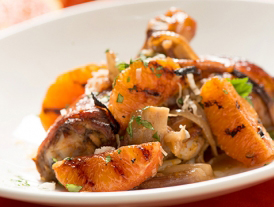 Top chefs know that exceptional produce is where flavor begins. More produce choices equates to more chances to shine. That’s why citrus is something to celebrate.
Top chefs know that exceptional produce is where flavor begins. More produce choices equates to more chances to shine. That’s why citrus is something to celebrate.
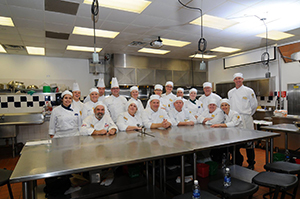 To further their understanding of the needs and expectations of chefs in the foodservice industry and expand their culinary knowledge and skills, the Emmi Roth Foodservice sales team participated in a culinary training program at Johnson & Wales University in Charlotte, N.C., January 19-23.
To further their understanding of the needs and expectations of chefs in the foodservice industry and expand their culinary knowledge and skills, the Emmi Roth Foodservice sales team participated in a culinary training program at Johnson & Wales University in Charlotte, N.C., January 19-23.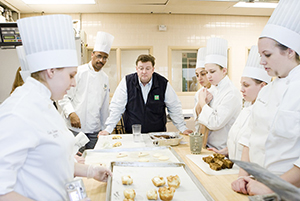 The Culinary Institute of America is naming the high-volume-production teaching kitchen in its new Student Commons at the Hyde Park, N.Y., campus after Jones Dairy Farm in recognition of the company’s ongoing support of the college.
The Culinary Institute of America is naming the high-volume-production teaching kitchen in its new Student Commons at the Hyde Park, N.Y., campus after Jones Dairy Farm in recognition of the company’s ongoing support of the college. Joe Perdue, CCM, CHE, the club industry’s leading hospitality educator, died in Atlanta on Jan. 19, 2015, after a long illness. He was 64.
Joe Perdue, CCM, CHE, the club industry’s leading hospitality educator, died in Atlanta on Jan. 19, 2015, after a long illness. He was 64.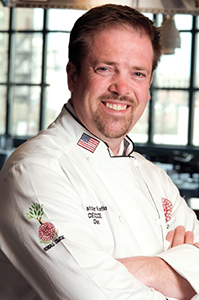 The deadline to submit your entry in the 7th-annual CAFÉ/Kendall College Green Award program is April 1.
The deadline to submit your entry in the 7th-annual CAFÉ/Kendall College Green Award program is April 1. Assigning an interview as an out-of-class activity will help your students practice networking, making connections with industry professionals and interacting in a professional manner.
Assigning an interview as an out-of-class activity will help your students practice networking, making connections with industry professionals and interacting in a professional manner. Why does measuring weight, volume and temperature require training? Because each measuring instrument is only as good as the person who uses it. To that end, Chef Weiner offers a primer on measuring to share with your students.
Why does measuring weight, volume and temperature require training? Because each measuring instrument is only as good as the person who uses it. To that end, Chef Weiner offers a primer on measuring to share with your students.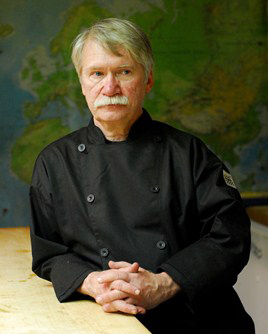 Everyone benefits from a well-branded program—from faculty and staff who take pride in their institution to employers who are able to hire well-prepared graduates to donors who line up to be on a winning team.
Everyone benefits from a well-branded program—from faculty and staff who take pride in their institution to employers who are able to hire well-prepared graduates to donors who line up to be on a winning team.